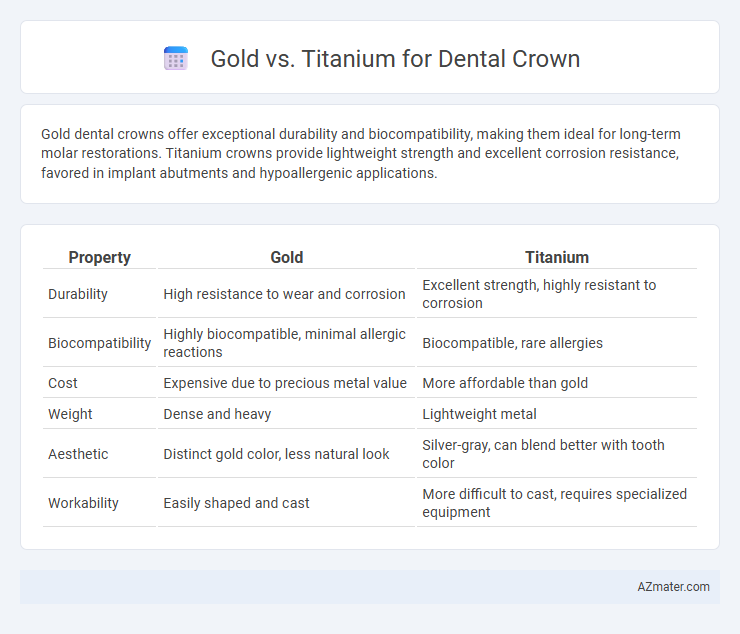Gold dental crowns offer exceptional durability and biocompatibility, making them ideal for long-term molar restorations. Titanium crowns provide lightweight strength and excellent corrosion resistance, favored in implant abutments and hypoallergenic applications.
Table of Comparison
| Property | Gold | Titanium |
|---|---|---|
| Durability | High resistance to wear and corrosion | Excellent strength, highly resistant to corrosion |
| Biocompatibility | Highly biocompatible, minimal allergic reactions | Biocompatible, rare allergies |
| Cost | Expensive due to precious metal value | More affordable than gold |
| Weight | Dense and heavy | Lightweight metal |
| Aesthetic | Distinct gold color, less natural look | Silver-gray, can blend better with tooth color |
| Workability | Easily shaped and cast | More difficult to cast, requires specialized equipment |
Introduction to Dental Crowns: Gold vs Titanium
Dental crowns restore damaged teeth by providing durable coverage, with gold and titanium being popular materials due to their strength and biocompatibility. Gold crowns offer excellent longevity, corrosion resistance, and adaptability to bite forces, making them ideal for molars. Titanium crowns are lightweight, highly resistant to corrosion, and promote gum health, preferred in patients with metal allergies or aesthetic concerns.
Material Properties: Gold Compared to Titanium
Gold dental crowns exhibit excellent malleability and corrosion resistance, ensuring a long-lasting and biocompatible restoration with minimal wear on opposing teeth. Titanium, while highly biocompatible and lightweight, offers superior strength and durability but is less malleable, which can impact the precision of crown fit and aesthetics. Gold's dense atomic structure contributes to its softness and ease of adjustment compared to titanium's rigid characteristics, making gold crowns preferable for patients prioritizing comfort and adaptability.
Durability and Longevity of Gold and Titanium Crowns
Gold crowns offer exceptional durability with wear resistance and biocompatibility, often lasting 20 years or more without significant degradation. Titanium crowns provide high strength and corrosion resistance, ensuring long-term stability, especially in patients with metal sensitivities. Both metals maintain structural integrity under biting forces, but gold's malleability contributes to a superior fit and reduced risk of cracking over time.
Biocompatibility: Which Material is Safer?
Gold dental crowns exhibit exceptional biocompatibility due to their inert nature, minimizing allergic reactions and gum irritation. Titanium crowns are also highly biocompatible, promoting osseointegration and reducing inflammation, especially in patients with metal sensitivities. Both materials demonstrate excellent safety profiles, but gold is often preferred for its proven long-term compatibility in oral environments.
Aesthetics: How Gold and Titanium Crowns Look
Gold crowns exhibit a distinctive warm, yellowish hue that stands out prominently against natural teeth, often chosen for their traditional and high-quality appearance. Titanium crowns feature a metallic gray color, which can appear duller and less natural compared to tooth-colored materials, making them more noticeable when used on visible teeth. Both metals lack the translucency and color matching of ceramic or porcelain crowns, impacting overall aesthetics in smile restoration.
Cost Comparison: Gold vs Titanium Crowns
Gold crowns typically cost between $800 and $2,500 per tooth, reflecting the high price of gold as a material and its superior durability and biocompatibility in dental restorations. Titanium crowns are generally more affordable, ranging from $500 to $1,500, making them a budget-friendly alternative while still offering strength and resistance to corrosion. The choice between gold and titanium crowns depends on factors such as budget constraints, aesthetic preferences, and long-term wear resistance.
Comfort and Fit: Patient Experience
Gold dental crowns offer superior comfort due to their excellent biocompatibility and natural flexibility, allowing a precise fit that minimizes irritation and wear on adjacent teeth. Titanium crowns provide a lightweight, strong alternative with a good fit but may cause less comfort for some patients because of their rigid structure and potential allergic reactions. Patient experience often favors gold crowns for long-term comfort and adaptability in the oral environment.
Maintenance and Care for Gold and Titanium Crowns
Gold crowns require regular dental check-ups to monitor for wear and ensure proper fit, benefiting from excellent corrosion resistance and biocompatibility that reduce plaque accumulation. Titanium crowns also demand routine professional cleanings and oral hygiene practices to prevent gum irritation, with their high strength and lightweight nature contributing to durability and comfort. Both materials resist discoloration well, but gold's malleability allows easier adjustments during maintenance compared to titanium's hardness.
Clinical Indications: When to Choose Gold or Titanium
Gold crowns are preferred for patients with heavy occlusal forces or bruxism due to their exceptional durability and wear resistance, making them ideal for posterior teeth restorations. Titanium crowns are recommended for patients with metal allergies or those requiring lightweight, biocompatible materials, often chosen for implant-supported crowns or situations where esthetics are less critical. Both materials offer excellent biocompatibility and corrosion resistance, but the choice depends on clinical factors such as load-bearing needs, patient sensitivity, and long-term oral health considerations.
Final Verdict: Which Crown Material is Better?
Gold crowns offer superior durability, biocompatibility, and excellent wear resistance, making them ideal for long-term dental restorations in posterior teeth. Titanium crowns provide a lightweight, corrosion-resistant alternative with good strength, often preferred for patients with metal allergies or those requiring a more natural appearance using ceramic overlays. The final verdict depends on individual patient needs, but gold crowns generally outperform titanium in longevity and clinical success for dental restorations.

Infographic: Gold vs Titanium for Dental Crown
 azmater.com
azmater.com